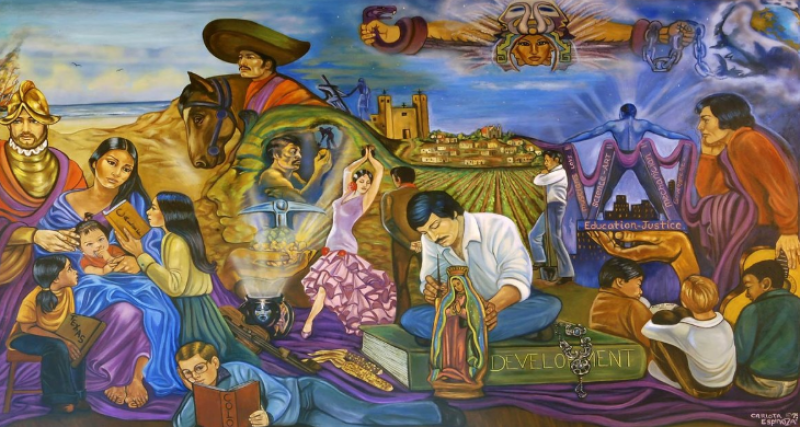Recovering Histories, Cultivating Leadership: Anti-Racist Pedagogy in Action
By: Thandiwe Sesa, University College, Organizational Leadership with Project Management

Pasado, Presente, Futuro mural by Carlota Espinoza at the Byers Branch Library in Lincoln Park
As a graduate student in the Organizational Leadership program at the University of Denver, my work explores how leadership practices can be shaped by collective action and social justice frameworks. My role as a Community-Engaged Fellow with Documenting the Past, Fostering the Future (DPFF) has provided a unique opportunity to bridge academic research with community-driven storytelling. Through this work, I examine how anti-racist pedagogy not only informs historical recovery but also cultivates leadership skills rooted in equity and collaboration.
DPFF is a humanities-centered curricular initiative that empowers students to recover and document past racial justice efforts in the Rocky Mountain West. As part of my community engagement work, I facilitate connections between students, faculty, and community members, ensuring that historical narratives are shaped by those most affected by them. Through archival research, oral histories, and critical reflection, students engage with the past in ways that challenge dominant perspectives while equipping themselves with the tools to lead in the present. This experience has deepened my understanding of anti-racist pedagogy as a leadership model one that prioritizes shared knowledge, critical inquiry, and historical accountability.
Findings
1. Anti-Racist Pedagogy as a Model for Collective Leadership
DPFF’s approach is deeply rooted in anti-racist pedagogy, which recognizes that knowledge is co-constructed through lived experience and historical recovery (Kishimoto, 2018). Through my engagement work, I have seen firsthand how students develop leadership skills centered on collaboration, critical thinking, and ethical decision-making qualities essential for cross-sector teams where leadership is distributed rather than hierarchical (Gutiérrez et al., 2019). These practices align with Chicana feminist perspectives, which emphasize collective agency and the disruption of dominant narratives (Delgado Bernal, 2002).
2. Historical Awareness Strengthens Organizational Leadership
Understanding historical struggles for racial justice provides valuable context for contemporary leadership challenges. DPFF’s curriculum highlights how past movements organized for change, offering lessons in resilience, coalition-building, and advocacy (Love, 2019). As part of my community engagement role, I work with students to not only uncover these histories but also apply their lessons in present-day leadership contexts. As Ladson-Billings (1995) argues, critical historical consciousness is vital for leaders committed to fostering inclusive and equity-driven environments. These insights reinforce the importance of historically informed leadership that actively resists reproducing systemic inequities.
3. Applying Anti-Racist Pedagogy to Leadership Development
DPFF demonstrates that leadership is not just about individual authority but about fostering environments where multiple voices contribute to decision-making (Freire, 1970). My role in facilitating dialogue between students and community members has shown me how participatory learning mirrors effective leadership strategies in organizations. Leaders who integrate these principles create more inclusive structures where diverse perspectives shape policies and practices (Sensoy & DiAngelo, 2017). By working with faculty, students, and community stakeholders, I have seen how embedding anti-racist pedagogy into leadership education fosters leaders who prioritize systemic change.
Conclusion
My experience as a Community Engagement Fellow has reinforced the idea that leadership must be historically informed and rooted in justice-oriented practices. Anti-racist pedagogy offers a framework for developing leaders who prioritize collaboration, community engagement, and systemic change. As I continue my studies in organizational leadership, I aim to integrate these insights into my approach, ensuring that leadership is not just about managing systems but about transforming them for equity and inclusion.
References
Freire, P. (1970). Pedagogy of the oppressed. Continuum.
Gutiérrez, K. D., Morales, P. Z., & Martinez, D. C. (2019). Reframing educational equity: Learning and teaching in communities of color. Review of Research in Education, 43(1), 203-232.
Kishimoto, K. (2018). Anti-racist pedagogy: From faculty’s self-reflection to organizing within and beyond the classroom. Race Ethnicity and Education, 21(4), 540-554.
Ladson-Billings, G. (1995). Toward a theory of culturally relevant pedagogy. American Educational Research Journal, 32(3), 465-491.
Love, B. L. (2019). We want to do more than survive: Abolitionist teaching and the pursuit of educational freedom. Beacon Press.
Sensoy, Ö., & DiAngelo, R. (2017). Is everyone really equal? An introduction to key concepts in social justice education. Teachers College Press